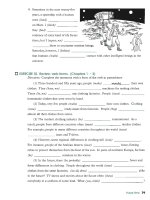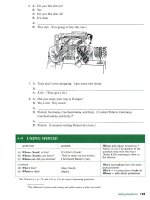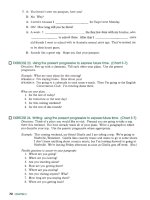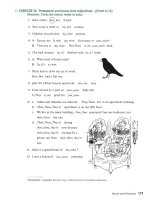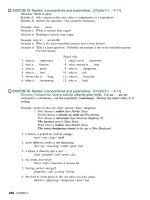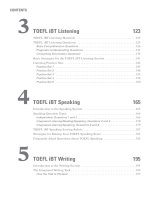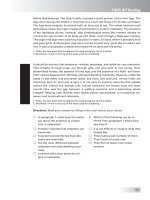Ship or sheep third edition part 14 potx
Bạn đang xem bản rút gọn của tài liệu. Xem và tải ngay bản đầy đủ của tài liệu tại đây (467.02 KB, 7 trang )
8l
lpl
pen
,*'
me. Please couldyou help me?
o,'n,
:an
I help
you?
Oh,
you
want
"
-
arcel
up there?
-
ur it
on top of that
pile of newspapers,
."i;te
Thankyou.
-:'<et
sound
/p/
I
a Listen to the sound
/p/. This is an
unvoiced sound.
\-
b To make
the
louder
sound
/p/ at the
h ,
beginning of a word,
first
close
your
lips hard. Then
push
air
forward in
vour
mouth.
**Then
quickly
open
your
lips to release the air suddenly.**
Don't
use
your
voice.
Listen
and repeat: /p/.
c
Notice
that sometimes
/p/ is
quieter
because the air isn't released
suddenly.
Listen.
up top help helps
help
me.
Omit
from
*x
to
x*
above to make this
quieter
sound.
-
-:-nd
pl
lpl
Pin
r+,-
^
, ,-^F, ,1
^i-
rIS
a u5eTur
Prn.
Pen
Pen,
pleasel
Peal
Look
at
the
yellow pear!
caP
r+r^
-^
^l-l
^
rt
> or
I
uru LoP.
PUP
What a
lively
pup!
PoPPy
Do
you
like
Poppy?
8il unn
2!
tpt pen
BTsa
a
In the words on
page
81,
notice that the target sound
is
quieter
in cap
and at the
end of
pup.
Listen and
repeat
the
words.
szsr
b
Listen to
the
sentences.
szgr
c sentence stress
The most important
words
for the speaker's
meaning are strongly
stressed. This
means that they are
pronounced
a
little more LOUDIy and
s
I
o
w Iy than the other
words
in the sentence.
Practise listening for
these
important words. They are underlined here.
It's a useful
piu.
Look at the
yellow pcar.
What a livelv
oun!
Pen,
please.
It's an old cap.
Do
you
like
Poppy?
ezgr d
Listen
again and
repeat the
sentences.
I
Dialogue
$
a
First
practise
the
target sound
/p/ in
words
from
the dialogue.
Read the
-
words
aloud or
visit the website to
practise.
The sound
/p/ is louder
before a
vowel, and fairly loud before'l'
or'r'.
One-syllable words:
pot pie piece
spoon
plate plane please
Two-syllable words:
pencil
Peter
pepper pocket
Poppy
postcard pulling
Paris
airport stupid
practise
plastic
people
apple
(The
strong
stress is
always
on the first syllable in these words.)
TWo-syllablewords:
surprised
perhaps
(The
strong
stress is always on the second syllable
in these words.)
Three-syllablewords:
passenger
newspaper
potato
impatient
pepper pot.
Note on word
stress: Word stress
doesn't
usually cfrange.
Bold
is
used to
show
you
which
part
of the word is strongly stressed,
i.e. which syllable
is always
pronounced
more LOUDIy and s I o w I
y
than the other(s).
Note
on
sentence stress: Sentence stress
changes with the speaker's
meaning. Underlining
is used here to show
you
which
words
in the
sentence
are being strongly stressed,
i.e. which words are
pronounced
more LOUDIy
and s I o w I
y
than
the others:
It's a
pieee
of
potato plc
on a
p.lastic plate.
Peter is surpdsed.
The
sound
/p/
is often
quieter
at the end of a
word.
an
envelope with a stamp Help! a
plpe
\.Vhat
happens
to
the
quiet
sound
if the next word begins with a
vowel?
a cup_of tea Help_us!
UNIT
25 lpr
pen
8iI
The sound /p/ is usually
quiet
and sometimes almost silent before a
consonant. Listen
and
repeat.
empty upstairs dropped help
me
helpful
perhaps
Mr Tupman stop shouting
stop talking stop
pulling
b
Listen
to the dialogue,
paying
attention
to the target
sound.
Notice
that
it
is sometimes louder or
quieter.
Then
read the dialogue and
fill
the
gaps
(1-6)
and
(a-f)
with the correct words from the
boxes.
Numbers I
and
a) have been done as examples.
Words 1-6 have a louder /p/ sound:
past pocket passports policeman pepper potato
Words
a-f have a ouieter /p/ sound:
upstairs
stop
envelope
cup dropped help
: :
*-s,
Please
(Mr
ond
Mrs Tupmon ore ot the oirport. They hove
just
got
off
the
plone
from
Poris)
OFFICIAL: Passports,
please!
MR TUPMAN: Poppy! Poppy! I think l've lost the t possporfs !
MRS
TUPMAN: How stupid of
you,
Peterl Didn't
you
put
them
in
your z- ?
MR TUPMAN:
(emptying
his
pockets)
Here's a
pen
a
pencil . my pipe
.
.
a
postcard
an a)
envelope
with a stamp
.
a
pin
MRS TUPMAN:
Oh,
b)_ taking things out of
your pockets. Perhaps
you put
them
in
the
plastic
bag
MR
TUPMAN:
(emptying
the
plostic
bog)
llere's a newspaper an apple
.
. a
pear
a
plasticc)_
.
aspoon somepaperplates.
:;::."
i,url''"'
o.
-
u ou'ooon
;i'"
MRS TUPMANi,Oh, stop
pulling
things out of the
plastic
bag, Peter.
These
people
are
gettrng
lmpatrent.
MR TUPMAN:
Well,
d)_ me, Poppy.
MRS TUPMAN:
(to
officiol) We've lost our
passports.
Perhaps
we
e)_
them
on the
plane.
OFFICIAL:
Then let
the other
passengers
5-
,
please.
MR TUPMAN: Poppy, why don't
you
help? You aren't
being
very
helpful. Put the
things
in the
plastic
bag.
OFFICIAL:
Your name.
please?
MR TUPMAN:
Tuoman.
oFFtCtAL:
Please
go
0_
with this 6_
,
Mr Tupman.
&[
utr
2t lpl
pen
nao c
Listen
to the dialogue
again to check
your
answers. Then
practise
reading the dialogue
aloud. Record
your
voice
to compare
your
production
of the target sound with
the
recording.
4 Stress and intonation
car
a Stress
Listen and underline
the stressed syllables.
The first one in
each
column
has
been done as an
example. Check
your
answers,
then listen and
repear.
apiu
a
pen
a
pear
some soap
a carpet
a
prano
a
plpe
a
puppy
an
expensive
present
for Poppy
a spoon
an apple
sez
b
Intonation
'
Intonation usually
goes
down on the last
strongly stressed word in
a
sentence. In a list,
the
intonation
goes
up with
each item but down on
the
last
item. Listen
and repeat.
He bought a
pen.
He bought a
pelt
and a
pencil.
He
bought a
pen
and
a
pcacil
and a
piu.
c Practise this
game
in
a
group
of
four or five. You
must remember what
the others have
said and then
add something to the list.
EXAMPLE
A: Peter went
to
Paris
and he bought
a
pipe.
B: Peter
went to
Paris and he bought a
pipe
and a
picture.
C: Peter went
to Paris and he
bought a
pipe,
a
picture
and
a
plano.
a
pe[cil
a
paper pla@
a
postcard
a
pepper pot
a
picture
a
plastic
spider
5 Spelling
Look
back over this unit at words
with the target
sound, and write what
you noticed
about how to spell the
sound /p/.
85
ll
lbt baby
fe those
people
backpackers? They've
l
packs
on their backs.
- rt they
aren't trauelling. They've
just
been
.:.opping
and they're waiting for
a bus or a cab.
-
S'-, does that mean they
aren't backpackers?
-
ner're
just
er
people
with
backpacks.
-
\lm.
1 Target
sound /bi
-
.
a First
practise
the unvoiced sound
/p/
(see
page
8l). Listen and repeat.
,,
b Use
your
voice to make the target
I
sound /b/. Listen and repeat.
-
r c Listen and repeat
both sounds
together.
/p/
is
unvoiced. lbl
is voiced.
:o
d Notice
that sometimes /b/ is
quieter
because the air isnt released suddenlv.
Listen.
job jobs
cab cabs
verb
verbs
2 Minimal
pairs
Sound I
tpt
Pin
It's a useful
pin.
Pen
Ben
Pen,
please!
Ben,
please!
-{1-\
Sound
2
tbt
bin
It's a useful
bear
Look
at the
yellow
bear.
t
vot ce
n"@
\;.: 1-,
-:'
"ffi
@
6€ffi
ffiffi
bin
Peal
Look at the
yellow pear.
caP Gab
It's an old can.
lt's an old
cab.
PUP Pub
What
a
lively
pup!
What a
lively
pub!
Poppy Bobby
Do
you
like Poppy? Do
you
like Bobby?
tu
&
unrr 24 /b;
babv
Minimal
pair
words
Bs4a
a Listen
and
repeat
the words. Notice
that the target
sound is
quieter
in
cab and
pub.
nslt
b You
will hear five words
from each minimal
pair.
For each word, write I
for /p/
(sound
1)
or 2 for lbl
(sound
2).
EXAMPLE Pair
l: 2,2,L,2,
Minimal
pair
sentences
Bssa c Listen
to the minimal
pair
sentences.
nasr
d
Listen to six of
the sentences
and
write 1 for
lpl
(sound
I)
or
2 for
bl
(sound
2).
B85a e sentence stress
Listen and underline
the strongly stressed
words in the minimal
pair
sentences
(on
page
85).'Notice
that when an important
word has more
than one
syllable,
Ike
yellow,
the sentence
stress is only
on
the strong
syllable.
EXAMPLE It's
a useful bin.
nae
f
Tick the words
a) or b) that
you
hear
in the sentences.
ra)pin
tr
b)bin
I
z
a)
Poppy
E
b)
Bobby
tr
3a)pup
I
b)pub
I
4a)pig
I
b)big
I
5 a)
pack
tr
b) back
6a)peach
tr
b)beach
-
3
Dialogue
6
a First practise
the
target sound /b/ in words from
the dialogue. Read
the
words aloud
or
visit
the
website
to
practise.
/b/ is LOUD
before a vowel
and
fairly
loud
before'l' and'r'.
One-syllable words:
big but been book
birds blue
black
blouse
Two-syllable
words:
better
busy cabbie Ruby
brother buttons
birthday
(first
syllable
stressed)
Two-syllable words:
about
(second
syllable stressed)
Three-syllablewords:
somebody
beautiful Barbara
butterflies
terribly
remember
/b/ is
often
quiet
before a consonant
or at the
end of a word.
a
cab
Bob
pub
a
proverb
Bob's
job.
Is it
louder when
the next word
begins
with
a vowel?
the
cab_over there the
pub_on
the corner
the
job_is
interesting
saz
b
Listen
to the dialogue,
paying
attention to the
target sound. Notice that
it is
sometimes louder
or
quieter.
UNIT 24 hi
babv 87
-itcl,"r*
Birthday
B0B: Hi, Barbara!
BARBARA: Hi, Bob. lt's
my birthday today
aoB
Oh,
yes!
Your
birthday! . er
Happy birthday, Barbara!
SARBAI{A: Thanks,
Bob. Somebody gave
me this blouse for my birthday
BoB: What
a
beautiful
blouse! lt's
pot
. , mm . er blue butterflies on it.
BARBARA: And
big black buttons.
BoB:
Did er mm Ruby buy
it for
you?
BARBARA:
Yes. And my brother gave me
a book about birds.
BOs: I
didn't remember
your
birthday, Barbara. l'm terribly
sorry.
l've
been so
busy with my new
job.
I left my
old
job.
The
one in the
pub.
Cuess
what? l'm driving
a cab.
BARBARA: A cabbiel Congratulations!
Don't worry about
the birthday
present,
Bob
But, remember that
proverb:
'Better
late than
never'.
c
Find five words
in the dialogue where
the sound /b/ is
quieter.
d Practise reading
the dialogue
aloud. Record
your
voice
to
compare your
production
of the target
sound with the recording.
Word
stress
trus
a In compound
nouns, the stress is
on the first word.
Listen and repeat.
I a
shelf
2
a brush
3 a card
4
a
ball
5 abag
6 aman
a
bookshelf
a
hairbrush
a
postcard
a football
a handbag
a
policeman
a
paintbrush
a birthday card
a
ping pong
ball
a shopping
bag
a
postman
sss
b Talk
about these
pictures.
Follow the
example. Listen
and
respond.
EXAMPLE
lt's a bookshelf.
:o
3
ball
1
bag
2
ball
4
bag

